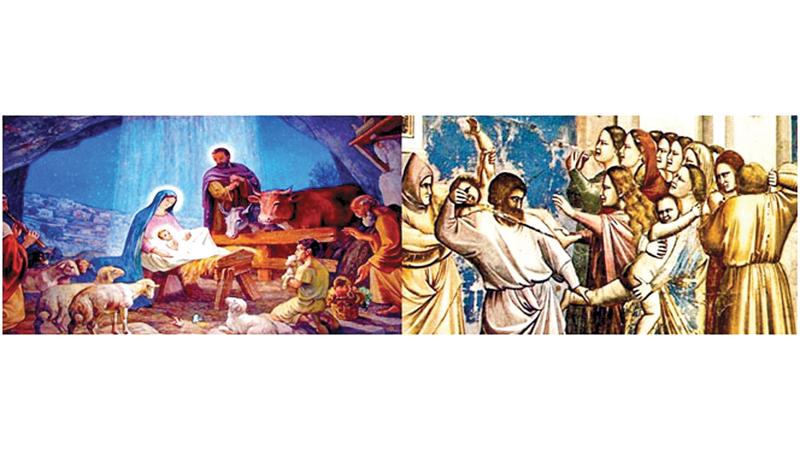
Christmas is among us, despite the subdued nature due to Covid-19 pandemic and global economic downturn. Leaders and laggards are much in talk these days in the midst of a growing optimism towards a better political culture.
 Apart from the traditional message of peace and harmony, this “festival of light” invites us to enlighten ourselves to relook at the sincerity of our decisions and actions. Let me call my Christmas reflection as a tale of two leaders.
Apart from the traditional message of peace and harmony, this “festival of light” invites us to enlighten ourselves to relook at the sincerity of our decisions and actions. Let me call my Christmas reflection as a tale of two leaders.
Overview
A manger in the little town of Bethlehem became world famous because of Christmas. It is not only a time to relax and refresh, but also to reflect and to reinforce. Despite the overly commercial coverage of Christmas, the true serenity associated with spirituality is still significant. As someone boldly said the other day, Christmas is certainly not Santa’s birthday.
Traditionally we associate Christmas with the birth of Jesus Christ, despite the fact that it was a Roman festival of light, subsequently adopted to commemorate the birth of Jesus. It is more symbolic than historical with a high spiritual message. There is a telling invitation for us to be spiritual, in superseding traditional religious boundaries. In doing so, let me focus on a lesser viewed angle of leadership.
Two leaders in Christmas
Christmas is associated with a king and a king of kings. A vicious leader and a visionary leader were much in action. One was an adult with all worldly power, and the other one was a child enjoying heavenly peace. Let me be specific. It is all above Herod the Great and baby Jesus.
I was inspired by a speech delivered by Rev. Prof. Aloysious Peiris, a globally renowned scriptural scholar and the first Catholic priest in Sri Lanka to obtain a doctorate in Buddhism.
I was also inspired by Archbishop Malcolm Cardinal Ranjith the way he responded to the Easter Sunday massacre in demonstrating true authentic leadership and winning many hearts among Buddhists in Sri Lanka. We can compare Herod with Jesus in identifying their nature and features.
Herod the Great was a Roman client king of Judea, famously known for his thirst for power, lust for women and interest in massive construction. He built a “Port City” in Caesarea, and massacred innocent children in order to destroy the threat of a future potential king.
The “king of kings” had all the right to be born in the most prestigious place on earth. Yet, the decision was to be born in a “manager” among animals, in becoming “eco-friendly”. The first visitors were shepherds representing the lowest strata of the society. It reminds me of a popular Christmas Carol ‘Away in a Manger’, with most-common musical settings by William J. Kirkpatrick (1895) and James Ramsey Murray (1887).
Away in a manger, no crib for a bed,
The little Lord Jesus laid down his sweet head.
The stars in the bright sky looked down where he lay,
The little Lord Jesus asleep on the hay.
The cattle are lowing, the baby awakes,
But little Lord Jesus, no crying he makes.
I love thee, Lord Jesus! look down from the sky,
And stay by my cradle till morning is nigh.
The contrast among the two leaders are much obvious. Let’s explore further.
A ‘Serpent’ leader and a ‘Servant’ leader
As we are much aware, leadership is not about positions and titles, but about decisions and actions. It is essentially a mindset. We look at the leaders at the top but not the “leaders at the tap”.
Servant leadership is perhaps one of the most ancient forms of leadership, aptly found in all great religious founders. When you consider the five hundred and fifty Jathaka stories, more than fifty percent of the time, Bodhisathva is portrayed as a leader. In some cases, as a one who serves others. In brief, a servant leader is a servant first. The simple motto is service first.
Chanakya, the famous author of Arthashastra, wrote, in the 4th century BC as follows:
“The king (leader) shall consider as good, not what pleases himself but what pleases his subjects (followers). The king (leader) is a paid servant and enjoys the resources of the state together with the people.”
There are passages that highlight the servant dimension of leadership, attributed to Lao-Tzu, who is believed to have lived in China sometime between 570 BC and 490 BC.
“The highest type of ruler is one whose existence the people are barely aware of. Next comes one whom they love and praise. Next comes one whom they fear. Next comes one whom they despise and defy.
“When you are lacking in faith, Others will be unfaithful to you. The Sage is self-effacing and scanty of words. When his task is accomplished and things have been completed, all the people say, ‘We ourselves have achieved it!’
The fascinating point here is that the servant leader appears as a “leader breeder” in developing his or her followers to serve others.
Jesus who washed the feet of his disciples showed the world of his true servant leadership. That’s why we say that those who serve deserve leadership. In contrast Herod the Great was not so great in this perspective, in suppressing others with oppressive force. For me, he was more a ‘serpent’ leader than a servant leader.
Herod was not a Jewish but a Roman king. He had become the ruler of the Jews with Roman help and boasted to be “the emperor’s friend”, dominating the power to entertain Agrippa, Augustus Caesars’ right-hand man. On top of the gate of the new Temple, a golden eagle was erected, a symbol of Roman power in the heart of the holy city resented by all pious believers. Herod concluded ten marriages, all began with political purposes and probably all ended with profound misery.
King of Slavery vs a King of Salvation
Herod ruled Judea with fear. He was insecure in actions and inconsistent in decisions. He was a slave to his lust and ended up having a ruined body. During nearly his whole reign, Herod faced trouble within his own family.
Historians say that he had killed his wife, Mariamne, out of jealousy. As the years went by, the whole matter was further complicated by the question of who would replace him on the throne. Like many people with a strong will to power, Herod could not face the idea of losing it. Three of Herod’s sons were put to death, and his brother “escaped death only by dying.”
When Herod finally died, two other sons had some claim to the throne. Augustus finally settled the matter by splitting the inheritance between these two sons and a third one, and not allowing the title of king to any of them.
Jesus in stark contrast was a king of salvation. His message was all about love. It radiates forgiveness and friendship with a faith in a heavenly father. He carried a heavy cross to Golgotha and was the supreme sacrifice for the sake of humanity.
He preached of a good Shepherd who would carry wounded sheep on his shoulders, as opposed to so-called leaders who go on others shoulders. His leadership was the cross first and then the crown.
If Herod was the ruler of hate, Jesus was the ruler of heart. Whilst Herod went on a killing rampage, baby Jesus was safe with Joseph and Mary in Egypt. Jesus invited people to turn away from their evil to experience peace, hope and joy. “A new command I give you: Love one another”. This provides the basis for human relations.
Lessons
There are plenty of don’ts from Herod and a bounty of do’s from Jesus. It is an invitation for managers to become servant leaders in demonstrating “spirituality” in action. It involves thinking and feeling of interconnectedness. It invites us to move away from being “vicious” in becoming “visionary”. It requires empathy in abundance.
Empathy can be viewed as “seeing with the eyes of another, listening with the ears of another and feeling with the heart of another.” We have seen the presence and absence of it with a multitude of leaders in action. During the pandemic that we are painfully going through, empathic leaders are much in demand. As we have often observed, the needed leadership should be holistic, humble, and humane. As Oprah Winfrey said, “Leadership is about having the ability to relate to and connect with people for the purpose of inspiring and empowering their lives.” Mother Sri Lanka needs more and more empathetic leaders.
Way forward
Let me briefly touch on one common carol we hear, ‘Mistletoe and Wine’. It was made popular by Cliff Richards.
A time for living, a time for believing
A time for trusting, not deceiving,
Love and laughter and joy ever after
Ours for the taking, just follow the master.
It is all about being humane, with serving in mind. Christmas invites us to serve others with love and compassion.
It challenges us to leave aside Herod’s ‘serpent’ leadership and embrace Jesus’s ‘servant’ leadership. There is no better time than this Christmas week to have reflections and resolutions.
Let that inward journey be a truly meaningful one, in bringing out the authentic leader in you and me.
